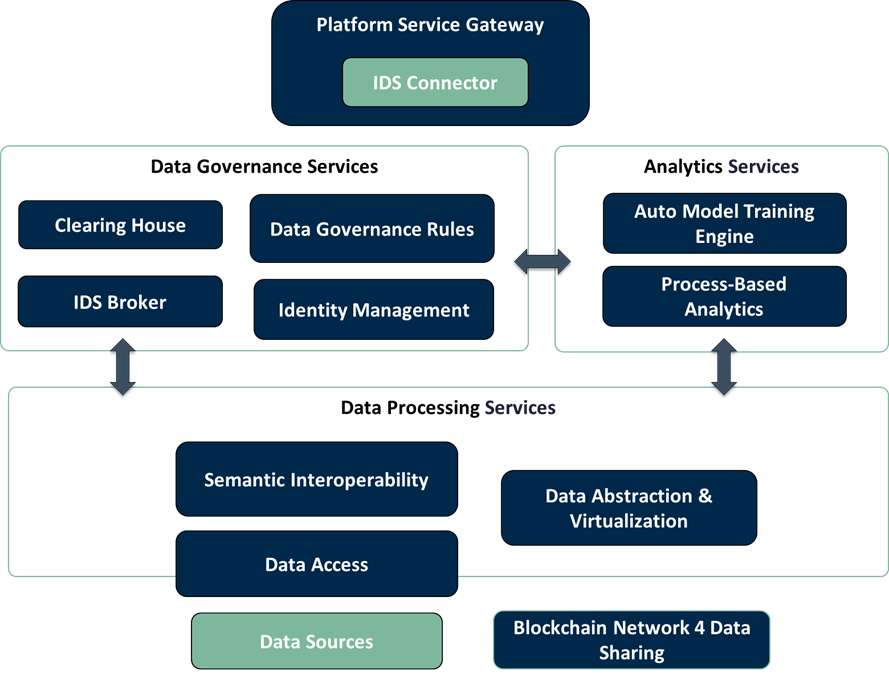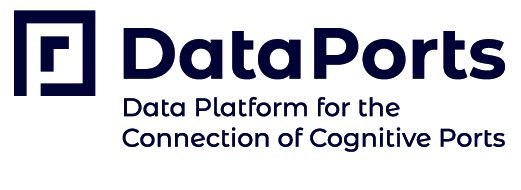The deliverables that describe the first version of the DataPorts platform components are now available.
Deliverables D3.1 “Data Access Interfaces”, D3.2 “Data Processing Services M18”, D3.3 “Data Analytics Services and Cognitive Applications M18” and D3.4 “Permissioned Blockchain Network M18” are now available on our website. These deliverables present the design, implementation, and current status of the different services of the DataPorts platform.

Deliverable D3.1 “Data Access Interfaces” describes the implementation and current status of the Data Access Component, which is the entry point of data to the DataPorts platform. This component connects the different data sources to the DataPorts platform in order to provide access to the data. The Data Access Component provides a REST API and a web User Interface to manage and run the agents that connect to the data sources.
Deliverable D3.2 “Data Processing Services M18” presents the implementation of the Semantic Interoperability Component and the Data Abstraction and Virtualization Component, describing their functionalities, technological stack, and relationships with other components of the platform, as well as their current implementation status. The Semantic Interoperability Component acts as a middleware layer between the Data Access Component and the upper layers, providing a common data model and interface to access the available data and metadata. The Data Abstraction and Virtualization Component acts as a link between the main data providers and data consumers of the DataPorts Platform. This component allows access to a variety of data sources through a single endpoint and prepares the data for consumption through pre-processing, filtering and data cleaning operations.
Deliverable D3.3 “Data Analytics Services and Cognitive Applications M18” presents the components of the DataPorts Platform that enable AI-based services. These components are the Process-based Analytics component and the Automatic Model Training Engine. The Process-based Analytics component aims to optimise the business processes of the port by making use of Machine Learning techniques to predict future states of an ongoing process. The Automatic Model Training Engine makes use of the data available in the DataPorts platform to generate Machine Learning models able to predict indicators that are relevant for the port business. This component provides a dashboard to automatically create and train a model to predict a specific indicator, which can be deployed as a cognitive service.
Deliverable D3.4 “Permissioned Blockchain Network M18” provides an overview of the Blockchain implementation activities in the DataPorts Project and describes the three Blockchain networks that will be used in the project. The Data Governance Blockchain network is an integral part of the DataPorts Platform and provides the Data Governance Rules (implemented as smart contracts) and Identity Management. In addition, two components of the IDSA architecture are provided by this network: the IDS Broker and the Clearing House. In addition, two Data Sharing networks have been implemented to support internal port business processes by providing trusted data sharing. The implementation of these networks has been tailored for two DataPorts use cases in particular. The Verified Gross Mass (VGM) Blockchain network has been developed for the VGM scenario of the Valencia Port use case and its purpose is to allow containers to arrive at the port with the verified gross weight, following the regulations. The Container Pick-Up network will facilitate secure information sharing between the Port of Thessaloniki and supply chain-related parties regarding the electronic request to pick up a container, in order to allow a better organization and management of the delivery of containers.
